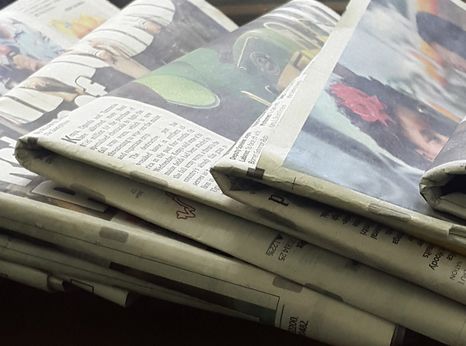Rakhine journalist remains in hiding

Aung Marm Oo (aka Aung Min Oo aka Oo Ba Khin) is the Executive Director and Editor-in-Chief of Development Media Group (DMG), a media agency founded in 2012 that reports on news and current affairs, with a focus on Rakhine State in western Myanmar. Since the start of 2019, when fighting escalated between the Myanmar military and the Arakan Army (AA), an ethnic Rakhine armed group, DMG has regularly reported on human rights violations and abuses, in particular by the Myanmar military.
On 1 May 2019, Aung Marm Oo was charged with Section 17(2) of the Unlawful Associations Act, which provides for up to five years’ imprisonment for any person who manages, assists or promotes an unlawful association. The Unlawful Associations Act is a vaguely worded law which has long been used by the Myanmar authorities to arrest and detain ethnic minority civilians in conflict-affected areas. To date Aung Marm Oo is unclear about what the charges specifically relate to, as the authorities have not sent to his family or DMG an official letter detailing the reasons. Aung Marm Oo believes they are linked to DMG’s reporting. He has been in hiding for more than a year now, fearing arrest and detention.
Under international human rights law and standards, all people charged with criminal offences have the right to be promptly informed in detail of the nature and cause of the charges against them. Information about charges should be provided in writing, and if provided orally, should be confirmed in writing. By not informing Aung Marm Oo of the criminal charges against him, the Myanmar authorities are not only denying him this right, they are also jeopardizing his right to adequate time and facilities to prepare a defence, which is also protected under international human rights law and is a crucial safeguard against unfair trials. The right to freedom of expression includes the right to seek, receive and impart information and ideas through any media and regardless of frontiers. Critical reporting on human rights violations by the military must not be restricted and under no circumstances criminalized.
Amnesty International and others have documented serious violations by the Myanmar military in Rakhine and Chin States, including war crimes, as well as abuses by the Arakan Army. Fighting between the two forces is ongoing, with continuing reports of violations. The government still has internet restrictions in eight townships in the two states where armed-conflict continues. As fighting between the two forces escalates with reports of new violations, the authorities are targeting news agencies and journalists reporting on the conflict. At least three media workers have been accused of violating counter-terrorism laws after airing interviews or seeking comment from with Khine Thu Kha, a spokesperson of the AA, which was declared an unlawful association on 23 March 2020.
One of the three media workers is Nay Myo Lin, editor of Voice of Myanmar, a news outlet based in Mandalay, Myanmar’s second largest city. He was detained for more than a week and charged under Sections 50(a) and 52(a) of the Counter Terrorism Law for publishing an interview with the Arakan Army spokesperson. Though he has been released after the court dropped the case, he could face life imprisonment if convicted. Hline Thit Zin Wai (aka Tha Lun Zaung Htet), editor and founder of Yangon-based Khit Thit Media, a news outlet that often reports on human rights and the situation in Rakhine State, is another media worker facing charges. He was also accused of violating the Counter Terrorism Law but has not been arrested yet. The third media worker is Mrat Kyaw, editor of Narinjara, a media outlet based in the Rakhine State capital of Sittwe. Counter-terrorism charges were filed against him in relation to a story that sought comment from the same AA spokesperson. He is now in hiding.
The crackdown on media freedom has been extended more widely amidst the COVID-19 outbreak as the authorities blocked independent media websites. In March 2020, the authorities issued three directives to block a total of 2,147 websites, including ethnic media, under Section 77 of the Telecommunications Law, which grants the government broad and arbitrary powers to suspend telecommunications networks.